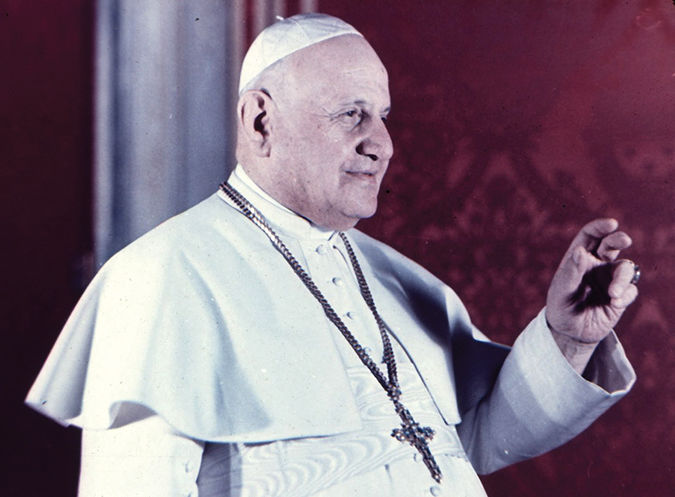The enthusiasm that swept the world for the person and work of the late Pope John XXIII is as astonishing in ecclesial annals as it is unparalleled.
Angelo Roncalli was indeed a man of heroic humility and evangelical simplicity. Elected to the papacy in 1958, his relatively short pontificate lasted less than five full years.
And yet within that half-decade, the Holy Father inspired a spontaneous veneration from all classes and levels of society. He became a legend even in his own lifetime.
Surely the pontiff’s greatest achievement was the convocation of Vatican Council II at Rome, in 1962. And though his immediate predecessor had already set in motion the machinery for the ecumenical gathering, the credit for actually calling the Church's 21st assemblage of bishops must go to John. His already advanced age and the first hints of serious illness forced the Holy Father to cut through innumerable practical problems to bring the council into being in record time.
And, with all its hasty preparations, Vatican Council II will rank as possibly the best planned in all the Church's history, thanks to the gentle prodding of the "peasant pope." The first session will always be referred to as the "Johannine Council."
As the world watched that noble conclave enter its later phases, it could hardly fail to see the shadow of Angelo Roncalli hovering over the proceedings as the council's "silent observer." Proponents of the ecumenical movement, in fact, attach great significance to the ceremony of presenting the red hat to Roncalli in the Elysée Palace, on Jan. 15, 1953. For that great moment in his life, the Patriarch-designate of Venice chose to kneel before a Protestant Chief-of-State!
He shared with Pius X, an earlier occupant of the patriarchal seat at Venice, a humble origin from the Lombard plain. An implicit faith, a simple piety, a strict devotion to Catholic traditions and a complete indifference to worldly possessions were the glory of both John XXIII and his sainted predecessor.
The worldwide response to Pope John XXIII reflects the truth that he was a man of God — humble, good, simple, poor and solely desirous of serving Christ, the Church and humankind. To call John a liberal would fail to explain his attraction to Pius IX; to call him a conservative would do violence to his wishes for an aggiornamento.
Probably this failure to fit John XXIII into a neatly-defined niche will prove to be his greatest asset, for it reveals the pontiff as a man old in years and young in ideas — a man who saw room enough in God's house for all people everywhere, a man who believed that "without a touch of sanctified madness, the Church cannot grow."
It was my good fortune to meet the Holy Father personally on Sept. 28, 1962 — the very day, we learned much later, that he had been told of the malignancy that would claim his life the following June.
The private audience, which took place in one of the smaller chambers of the Apostolic Palace, was comprised of only nine people, including the newly elected Superior General of the Notre Dame Sisters and the Apostolic Inter-Nuncio to Pakistan.
The Holy Father was about half an hour late when he walked into the room, smiling and cheerful. I was the fourth person in line, and when I told him that I was from Los Angeles, he immediately countered with the observation that his name "Angelo" gave him a special kinship to Los Angeles. He then spoke about devotion to the angels, and I was not about to tell him that our archdiocese was dedicated to "Our Lady" of the Angels.
Somewhere I have a photograph of my speaking with the Pope. Surely he exuded the charm and sanctity one would associate with one called to that lofty state.
As the Holy Father was about to leave, he turned and asked each of us to pray for the success of the council which was scheduled to convene only a few days later. I was standing in the Piazza di San Pietro for the opening of the historic gathering — hardly imagining what blessings and challenges Vatican Council II would bring to the Catholic Church.
Msgr. Francis J. Weber, archivist emeritus for the archdiocese of Los Angeles, will share his reflection on Pope John Paul II in next week’s Tidings.

